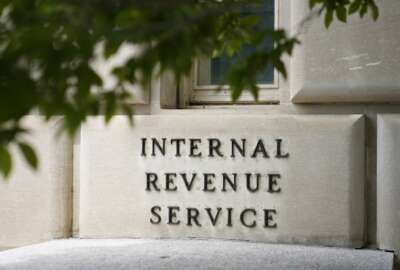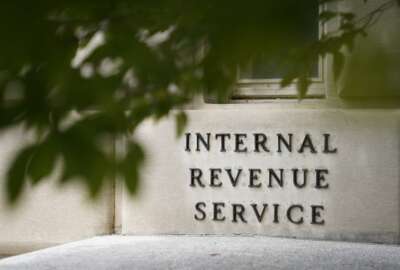The IRS overseer, known as TIGTA, marks 25 years in business
For the last 25 years, the Treasury Inspector General for Tax Administration, known as TIGTA, oversaw the IRS as they kept them on their toes.
The IRS wants U.S. citizens to be honest about paying their tax obligations. But who keeps the IRS on its toes? For the last 25 years, that’s been the job of the Treasury Inspector General for Tax Administration, known as TIGTA. It started in 1999, following a landmark Congressional overhaul of the IRS in 1998. Senior advisor Matt Schimmel joined the Federal Drive with Tom Temin with a review.
Interview transcript:
Tom Temin: And so the TIGTA then did not result from the Inspectors General Act, but from specific IRS legislation?
Matt Schimmel: That’s correct. There’s about 70 some odd inspectors general across the federal government and they’re all designed to provide oversight of the individual agency that they oversee, looking for fraud, waste and abuse and identifying programmatic improvements. In most of these, 70 some IGs have their origins with the Inspector General Act of 1978. But we came about 20 years after that. Prior to our creation in 1999, we were within the IRS for several decades, and it was sort of seen as a technical correction to the 1978 legislation where the oversight function with an IRS was internal reported directly to the IRS commissioner. And now we are we are separate, provide oversight, no longer report to the IRS commissioner.
Tom Temin: Right. The events that led to that 1998 overhaul of the IRS and that went on for several years was at that time, I think Congress saw it as a little bit of a rogue agency.
Matt Schimmel: Yeah, there was a history there of what was seen as an enforcement first type culture with less of an emphasis on customer service. So this was an attempt by Congress to really restructure and reorganize the IRS so that it was focused on taxpayers and certain segments of taxpayers, and then also to beef up some of the taxpayer rights that we’ve always had, but codified those in several ways.
Tom Temin: And there’s another whole structure at the IRS called the Taxpayer Advocate, which is kind of looks like an inspector general in some respects. How do you interoperate with, say, the taxpayer advocate and make sure you’re not both piling on the same issue, for example?
Matt Schimmel: So that’s a great question. And that’s one of the reasons that we wanted to do a 25-year type social media campaign to really demystify who we are, what we do. And even though 25 years may seem like a long time, we are relatively new compared to the rest of the IG community. That’s what inspector generals are commonly called IGs. And it’s somewhat compounded for TIGTA because there are several organizations, Taxpayer Advocate Service being one of them, but Government Accountability Office and then IRS also has several internal advisory groups. So we’re all kind of providing comprehensive oversight of the IRS, but doing so from different perspectives. We might have different statutory authorities, different areas of jurisdiction. And so the Taxpayer Advocate Service, they can help resolve individual cases that you’re having. If you can’t if you’ve been working with the IRS and have not been able to resolve your issue, the Taxpayer Advocate Service can step in and help you on an individual basis. But they also do systemic reviews to look at opportunities to make it easier to resolve an identity theft case that you have with the IRS.
Tom Temin: Sure.
Matt Schimmel: So and that’s where we kind of overlap. We do some of those larger programmatic reviews, systemic areas of IRS operations. We don’t look at individual cases.
Tom Temin: Right. Well, another way to look at it is they might look at the effect of what happens at the IRS, but you would look at what’s going on. And I’m thinking of tax systems modernization, which is actually predates TIGTA. I mean, they started that in the early 90s and still not there yet. But the lack of modernization or the failure of one of the modernization projects could have an effect that the Advocate would look at. But you would look at what went wrong internally here that they spent this money and didn’t get what they wanted.
Matt Schimmel: Absolutely. And information technology modernization is a huge point of emphasis for our workload. It’s one of the major challenges that we’ve identified for the IRS. And a lot of the computer systems that the IRS has predate TIGTA to your point. And so we’ve been really on top of seeing how they’re modernizing those and decommissioning some of the older systems that are no longer relevant. And it’s funny, as part of this campaign, we’ve kind of been looking at it’s one of these things. The more that things change, the more they stay the same. And IT modernization had a little bit of a different flavor back in 1999 when we started. You might remember Y2K.
Tom Temin: Oh yes.
Matt Schimmel: Conversion efforts.
Tom Temin: I remember it well.
Matt Schimmel: That was a very big issue for the IRS in particular because if the computer programing codes were not changed or revised, it would have potentially stopped the processing of tax returns. So some of our earliest work was to look at Y2K conversion efforts at the IRS to make sure that they were prepared to handle it. Now, IT modernization as a concept still lingers except the issues might look a little bit different. Cloud computing, the adoption of that.
Tom Temin: Sure.
Matt Schimmel: Like I said, decommissioning of older systems.
Tom Temin: We’re speaking with Matt Schimmel. He’s senior advisor at the Treasury Inspector General for Tax Administration as it celebrates 25 years. And usually 25-year marks are retrospectives on some of the highlights. And notwithstanding the highlights of inspector general work might seem like an oxymoron. What are some of the highlights?
Matt Schimmel: So it has been fun to look back and reflect on all the accomplishments that we’ve had over the last quarter century. And there might be a little bit of recency bias at play here. But one of the investigations that we’re most proud of is one where earlier this year, an IRS contractor was sentenced to five years in prison for the unauthorized disclosure and access and disclosure of thousands of taxpayer records to multiple news organizations. And so that’s an example of some of the work that our Office of Investigations does. They will investigate any sort of external attempts to affect the integrity of Tax Administration and the unauthorized access and disclosure of taxpayer information. Sensitive taxpayer information is something that we take very seriously. So that’s just an individual example of a case that we’ve done. We’re also our Office of Inspections and Evaluations did a larger review on the heels of that sentencing to kind of look at how do IRS employees go about accessing data, how do they get access, who has access to this data. And so provided this sort of landscape view of who has data at the IRS and there’s 92,000 IRS employees and contractors that have access to nearly 300 different systems. And what we found in that review was that audit trail logs, for example, which are a very effective tool for our investigators to use to kind of track down and figure out, ‘Well, who accessed it.’ The data. That was one of the findings that came out of that report and it was just recently recognized, I think it’s a great report, but it was also recognized by CIGIE, which is the Council of the Inspectors General on Integrity and Efficiency, sort of a clearinghouse of sorts for all the IGs has an annual award ceremony and they recognize that specific project.
Tom Temin: I imagine data analytics must be coming big time into the work that you do because, for example, to continue, if you are looking at what people are accessing, that all generates logs, logs or data that can be analyzed to find out why is Charlie there, keep looking at Brad Pitt’s return or something, that type of thing.
Matt Schimmel: Absolutely. So IRS collects a ton of data. They’re processing hundreds of millions of tax returns every year. They collect nearly $5 trillion in payments. Taxpayers will send in supporting documentation. There’s phone calls. All of these records, all of these payments, all of these returns form data. And it’s something that we have to use to do our work. And back in the day, we would have to before the evolution of data analytics, you would have to have our auditors would pull a sample of cases and review those manually and then project to a population. But now with the power of data analytics, we’re able to analyze entire populations of data.
Tom Temin: Right. No more sampling.
Matt Schimmel: Yeah, we’re working smarter, we’re working faster and we’re providing a more complete picture. So the analogy that we like to use sometimes is that if you think of IRS employees and taxpayers as a big haystack, back in the day, we would have to take a little tiny piece of that haystack and review it and hope that we found a few needles in the project. But now we’re able to, through the power of data analytics, just to drag a magnet through that entire haystack and collect all the needles that we know that are going to be in there.
Tom Temin: And the other issue I wonder how you look at this one is the, from time to time, the periodic accusations of now they call it weaponization or people administration’s using the IRS for political purposes. I remember these charges going back to the Nixon administration. ‘Let’s audit the.’ I think the Nixon White House tapes said. And then there was the Lois Lerner episode during the Obama administration, still not fully resolved in many, many minds, even though the president at the time said there was not a smidgen of corruption, that type of thing. How do you keep an even keel and look at those things objectively and to make sure that doesn’t happen to the IRS in any organized way?
Matt Schimmel: Right. It’s making sure that we ingrain into our staff the importance of being independent and objective. And we’ve got quite a track record over 25 years of doing our work in just that type of manner.
Tom Temin: Because that really gets to the idea of credibility. And that’s something that if the public may not like paying taxes. But if they believe in the credibility of the IRS, then at least you won’t have that element of defiance because they don’t think the agency itself is fair.
Matt Schimmel: Here’s a good example of that. So if you think about prior abuses, for lack of a better word, that kind of abuse predate the existence of TIGTA. There was a concern at the time when Congress did create the Restructuring Reform Act of 1998, of which TIGTA as our genesis, the Congress was concerned that the IRS was labeling people as illegal tax protesters in the case files. And so the concern was it would stigmatize tax payers labeling them and they might get unfair treatment because of that label. And so we do an annual review, this is required by law. Since 1999, we’ve been doing this every year. We look through IRS case files and make sure that no taxpayer is being referred to as an illegal tax protester. Now, we used to have to do that manually. Now getting collecting this back to data analytics, we can review entire populations now and use text mining tools to search very quickly to see if those words or variations of those words are in the case files that IRS has on taxpayers.
Tom Temin: Right. Someone could be a tax protester but still fulfill their legal obligation. It’s just not like it.
Matt Schimmel: That’s absolutely correct.
Tom Temin: All right. So where do you go from here? What’s the priorities in the next few years for TIGTA?
Matt Schimmel: So we just issued our annual auto plans and those map of what we’re going to do for inspections and evaluations. Again, some of the same areas that we’ve always been concerned about. We’re going to be on top of for the next 25 years. So IRS impersonation scams is a big body of work that our Office of Investigations does. Those kind of take a different flavor depending on what the specific form of relief that.
Tom Temin: Well, the age of phishing emails and all of these sophisticated online scams. That’s kind of an amplified issue, isn’t it?
Matt Schimmel: Correct. And they evolve constantly. So we have to stay on top and adapt just as quickly as the fraudsters are. But we’re looking at human capital as an area of concern for IRS. I know we spoke earlier about IT modernization. So those are things that we’re going to be really focused on going forward.
Tom Temin: And how’s the human capital situation for TIGTA? What kinds of expertise do you need and how are you doing on attracting people and keeping them?
Matt Schimmel: So we’ve got about 800 employees and nearly half are auditors, nearly half are investigators. And then we have support staff, lawyers and IT professionals. And I think the challenge is facing, not just TIGTA, but the IG community at large on the audit side is that accounting has become less common as an academic discipline. There’s just not a lot of people coming out of school anymore with accounting majors. So we’re thinking a little creatively and differently about who we try to attract for those types of positions. And then what types of, we’re on social media. We’re trying to beef up our presence out there and some of our external messaging there. So that brings a totally different discipline. I mean, I’m sure we’re talking on radio here, but 10, 15 years ago, the apps that are very common or not. So we’re trying to keep pace with constantly with the adaption.
Tom Temin: And we’ll be online and also as a podcast in addition to the broadcast.
Matt Schimmel: And that’s kind of the vision that we’re trying to get to as well is that a la carte menu of communications.
Copyright © 2025 Federal News Network. All rights reserved. This website is not intended for users located within the European Economic Area.
Tom Temin is host of the Federal Drive and has been providing insight on federal technology and management issues for more than 30 years.
Follow @tteminWFED






